NOVEMBER 5- TODAY’S READING FROM THE ONE YEAR BIBLE- EZEKIEL 12:1-14:11; HEBREWS 7:1-17; PSALMS 105:37-45; PROVERBS 27:3
TODAY’S READING FROM THE OLD TESTAMENT- EZEKIEL 12:1-14:11
It is instructive to note words and phrases that are repeated often in a book of the Bible. We certainly see significant repeated words and phrases in today’s reading in the Book of Ezekiel.
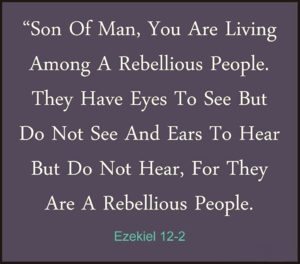 Judah and Israel are regarded by the Lord as ‘rebellious’, ‘a rebellious people’, and ‘a rebellious house’, (12:2,3,9, 25). In their rebellion, they are described as violent, idolatrous, and full of detestable practices.
Judah and Israel are regarded by the Lord as ‘rebellious’, ‘a rebellious people’, and ‘a rebellious house’, (12:2,3,9, 25). In their rebellion, they are described as violent, idolatrous, and full of detestable practices.
Therefore, God was bringing a judgment upon them. The desired result?
“Then they will know that I am the Lord” (12:15,16, 20, 13:9, 14, 21, 23; 14:8).
Ezekiel is to let the people know that he will be a ‘sign to the house of Israel’. He is not only to preach the message; he is to exhibit it.
Once again, Ezekiel is directed by the Lord to stage a prophetic drama.
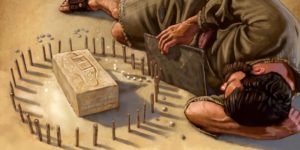 You will recall that the first drama, The Siege of the City” (Ezekiel 4-17), was a mime. It was the longest-running show in Babylon- lasting for 430 days. Act 1, titled “Bearing the Iniquity of Israel”, lasted 390 days. Act 2, “Bearing the Iniquity of Judah”, lasted 40 days.
You will recall that the first drama, The Siege of the City” (Ezekiel 4-17), was a mime. It was the longest-running show in Babylon- lasting for 430 days. Act 1, titled “Bearing the Iniquity of Israel”, lasted 390 days. Act 2, “Bearing the Iniquity of Judah”, lasted 40 days.
This first instructive dramatization was followed up with another mime; we might call it, “Hair” (not the musical), in which Ezekiel, the sole performer, would cut his hair off completely. Just as a razor shaves away hair from the face and head, so the invading armies would cut away the people from the land. Hair was a sign of consecration to God. The household of Israel and Judah had cast off the covering of God. He then divided his shorn hair (Ezekiel 5:1-4) into thirds. Each third will have a different trajectory- a third cast into the fire, a third cast to the wind, a third will fall to the sword. Finally, all three go to the fire. (This prophesied that a third would fall to pestilence and famine in the siege, a third would fall by the sword, and another third would be scattered to all the winds, and the Lord would send the sword after them. (Ezekiel 5:11-12) Only a few strands, a small remnant, would be saved in the folds of his skirt as a picture of the hope for the future.
The third drama involved words, as Ezekiel was to prophesy to the mountains. Chapter 6 contains the script.
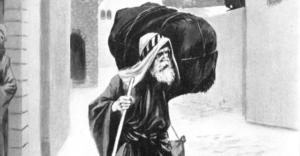 In chapter 12, Ezekiel is given new dramas to perform. The next piece of living theater, the fourth, depicts the deportation to Babylon. Ezekiel is told to stage a drama in which he packs his luggage for a long trip in which he will go into exile (12:3-7). He will pack only the barest essentials for survival, as he is not headed for a luxury cruise but years in captivity. He packs a skin canteen for water, a mat for sleeping, and perhaps a bowl for food. He was to depart in the night, suggesting a time of spiritual darkness for the nation, carrying his gear.
In chapter 12, Ezekiel is given new dramas to perform. The next piece of living theater, the fourth, depicts the deportation to Babylon. Ezekiel is told to stage a drama in which he packs his luggage for a long trip in which he will go into exile (12:3-7). He will pack only the barest essentials for survival, as he is not headed for a luxury cruise but years in captivity. He packs a skin canteen for water, a mat for sleeping, and perhaps a bowl for food. He was to depart in the night, suggesting a time of spiritual darkness for the nation, carrying his gear.
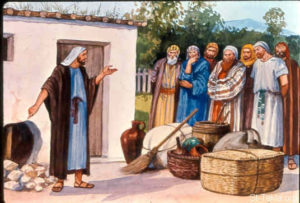 He was instructed to dig through the wall of his house, which was most likely part of the city wall. He was prophetically portraying a God-given provision of an escape from the city for the king. In a siege, Jerusalem would be surrounded by the invading Babylonians. Ezekiel was told to carry his belongings on his shoulder and cover his face so he would not see the land. This prophetically pictured the escape of Zedekiah, ‘ the prince’ (Ezekiel considered Jehoiachin the legitimate king). The fact that his face was to be covered foretold the truth that he would be blinded and taken to Babylon. He would not see the land that he would be taken to. Some survivors would flee to other countries where the sword would catch up with them, and only a small remnant of survivors would remain in Jerusalem.
He was instructed to dig through the wall of his house, which was most likely part of the city wall. He was prophetically portraying a God-given provision of an escape from the city for the king. In a siege, Jerusalem would be surrounded by the invading Babylonians. Ezekiel was told to carry his belongings on his shoulder and cover his face so he would not see the land. This prophetically pictured the escape of Zedekiah, ‘ the prince’ (Ezekiel considered Jehoiachin the legitimate king). The fact that his face was to be covered foretold the truth that he would be blinded and taken to Babylon. He would not see the land that he would be taken to. Some survivors would flee to other countries where the sword would catch up with them, and only a small remnant of survivors would remain in Jerusalem.
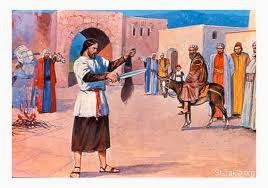 A fifth drama is acted out in Chapter 12:17-20. It is “The Drama of the Nervous Eater”. This drama would be accompanied by a verbal explanation. The land will be stripped bare due to the violence and the uncertainty of having any food and drink. They would be forced to eat rations of food and drink, not knowing if they would have any provision in the future.
A fifth drama is acted out in Chapter 12:17-20. It is “The Drama of the Nervous Eater”. This drama would be accompanied by a verbal explanation. The land will be stripped bare due to the violence and the uncertainty of having any food and drink. They would be forced to eat rations of food and drink, not knowing if they would have any provision in the future.
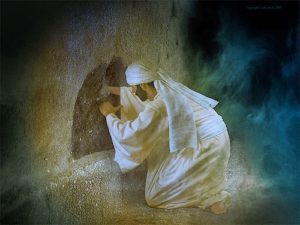 In Chapter 12:21-28, the word of the Lord comes to Ezekiel, and he is told to prophesy against the false proverb, “The days go by and every vision comes to nothing.” The people discount the warnings of judgment given by the true prophets, and instead, they listen to false prosperity preachers who predicted that no judgment was on the horizon. They prophesied ‘peace, peace’ where there is no peace (Jeremiah 6:14; 8:11; Ezekiel 13:10).
In Chapter 12:21-28, the word of the Lord comes to Ezekiel, and he is told to prophesy against the false proverb, “The days go by and every vision comes to nothing.” The people discount the warnings of judgment given by the true prophets, and instead, they listen to false prosperity preachers who predicted that no judgment was on the horizon. They prophesied ‘peace, peace’ where there is no peace (Jeremiah 6:14; 8:11; Ezekiel 13:10).
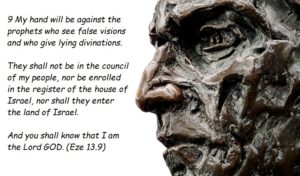 Ezekiel 13:10 10 Precisely because they have misled my people, saying, ‘Peace,’ when there is no peace, and because, when the people build a wall, these prophets smear it with whitewash,
Ezekiel 13:10 10 Precisely because they have misled my people, saying, ‘Peace,’ when there is no peace, and because, when the people build a wall, these prophets smear it with whitewash,
TODAY’S READING FROM THE NEW TESTAMENT – HEBREWS 7:1-17
Jesus maintains our positional righteousness, acceptance, and nearness to God as our Great High Priest.
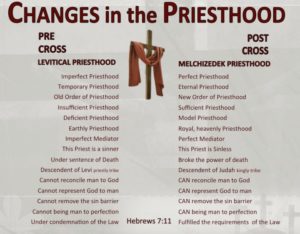 As we have already seen, Jesus has a greater priesthood than Aaron. Jesus stands apart from all others in that He has the power of an endless, deathless, indestructible life. He is a priest after the order of Melchizedek.
As we have already seen, Jesus has a greater priesthood than Aaron. Jesus stands apart from all others in that He has the power of an endless, deathless, indestructible life. He is a priest after the order of Melchizedek.
The writer underscores Jesus’ superiority by pointing out that Aaron was positionally in (the loins of) Levi, Levi in (the loins) of Jacob, Jacob in Isaac, and Isaac in Abraham when Abraham offered tithes in thanksgiving to Melchizedek. The lesser is blessed by the Greater. Not only is Melchizedek greater than Aaron and Levi, but he is also greater than Abraham. Melchizedek represents the eternal King and Priest who rules a kingdom of righteousness and peace. If this is not a Christophany (a pre-incarnate appearance of Christ), it is certainly a foreshadowing of Christ and purposed under the inspiration of the Holy Spirit to be a representative type of Christ in our understanding.
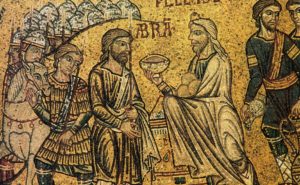 The law required a tenth to be collected and given to the Levites, but Levi was in Abraham when Abraham gave a tenth to Melchizedek. This was before any law was given. Melchizedek received a once and for all offering from Abraham. The Levites received the tithes continually and offered sacrifices that could not put away sin, and they died with their work unfinished. The Levitical priests had a temporal calling without a binding oath, so the priesthood could change as generations failed or died. Jesus’ priesthood was made with a binding oath, so that it could not be changed. It was perfect.
The law required a tenth to be collected and given to the Levites, but Levi was in Abraham when Abraham gave a tenth to Melchizedek. This was before any law was given. Melchizedek received a once and for all offering from Abraham. The Levites received the tithes continually and offered sacrifices that could not put away sin, and they died with their work unfinished. The Levitical priests had a temporal calling without a binding oath, so the priesthood could change as generations failed or died. Jesus’ priesthood was made with a binding oath, so that it could not be changed. It was perfect.
Jesus’ superior priesthood endures forever, and He is worthy to be honored as the One who gives the victory. Just as Abraham’s offering preceded that which was required in the law, Jesus, as a Priest, after the order of Melchizedek, has a priesthood that transcends that which is prescribed in the law. It is unchangeable. It is indestructible.
TODAY’S READING FROM THE BOOK OF PSALMS – PSALMS 105:37-45
 The Psalmist continues to praise the Lord for His faithfulness to His people. He brought them out of Egypt laden with silver and gold. He guided them through the wilderness and provided for them miraculously. He caused their enemies to fear them. He gave them the promised land.
The Psalmist continues to praise the Lord for His faithfulness to His people. He brought them out of Egypt laden with silver and gold. He guided them through the wilderness and provided for them miraculously. He caused their enemies to fear them. He gave them the promised land.
Psalm 105:44-45 44 And he gave them the lands of the nations, and they took possession of the fruit of the peoples’ toil, 45 that they might keep his statutes and observe his laws. Praise the LORD!
Like the Psalmist, we should remember God’s faithfulness to us in all the great things He has done.
TODAY’S READING FROM THE BOOK OF PROVERBS – PROVERBS 27:3
Proverbs 27:3 3 A stone is heavy, and sand is weighty, but a fool’s provocation is heavier than both.
Provocations in human relationships create burdens that are heavy to bear and difficult to put down. It is best to think before you act or speak.
PRAY FOR THE NATIONS- SRI LANKA
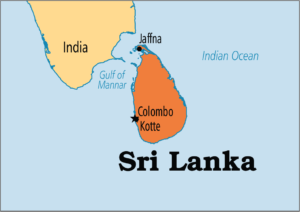 (From Prayercast.com and “Operation World” Prayer App)
(From Prayercast.com and “Operation World” Prayer App)
Sri Lanka, “The Pearl of the Indian Ocean,” can be described in superlatives. One of the longest documented histories in the world. Oldest democracy in South Asia. One of the top biodiversity hotspots in the world. First country in recorded history to have a female ruler. First modern nation with a female elected head of state. And, interestingly, the third most religious country in the world.
This Asian island off the southeast coast of India is reputed to have been King Solomon’s source for ivory, peacocks, and valuables, which he imported from the ancient seaport of Tarshish. An important stop on the Silk Road, Arab traders, called ancient Ceylon “Serendip”, a Sanskrit term referencing the discovery of something by accident, which formed the root of the modern “serendipity”. Today, Sri Lanka, or “venerable island,” boasts one of the fastest-growing economies in the world, with over 60% of the gross domestic product coming from the service sector. However, severe income inequality and ethnic prejudice have driven large numbers of its citizens to seek work outside of the country. As a result, these populations are exploited, abused, and at times, enslaved at the hands of unscrupulous employers.
Ninety-nine percent of Sri Lankans say that religion is important in their lives, and the most recent civil war speaks to these strongly held beliefs. The war, waged over religious and ethnic divides, lasted from 1983 to 2009. And yet, despite efforts to preserve their religion and culture, significant increases in alcoholism, suicide, casual violence, and rape reveal a crisis in the belief systems to which Sri Lankans cling. Buddhism, the national religion, is protected and promoted, and while freedom of religion is guaranteed by law, violence and persecution against the 8% mostly Catholic Christian minority are not uncommon. As the number of Christians in Sri Lanka grows, we pray they continue to search for the pearl of great price – the hearts of the Sri Lankan people.
The end of civil war was an answer to prayer. Government forces defeated the “Tamil Tigers” in 2009, but with much violence. Sri Lanka suffered greatly in the past generation from the long civil war, the excessively bloody end to the conflict, and the 2004 tsunami. Over 100,000 people lost their lives, and over 900,000 (mostly Tamils) fled the country. More than 1 million people left their homes. Many Tamils feel deep resentment. Corruption and ethnic prejudice remain common. Pray that this new era might bring a time of safety, stability, justice for all ethnic and religious groups, and freedom for the gospel.
PRAYER: Heavenly Father, in Your Son, we see the message in the man. He has demonstrated in both His actions and His Word the truth about your holiness, the truth about our condition under wrath, and the truth of Your gracious provision for our salvation. We thank You for His perfect priesthood and His perfect sacrifice that made possible our reconciliation. Thank You for adopting us and blessing us with every spiritual blessing in Christ. We ask that Your Holy Spirit bring to our remembrance the great things you have done and that we would boldly proclaim the gospel of our salvation. In Jesus’ Name. Amen.
-Pastor David
